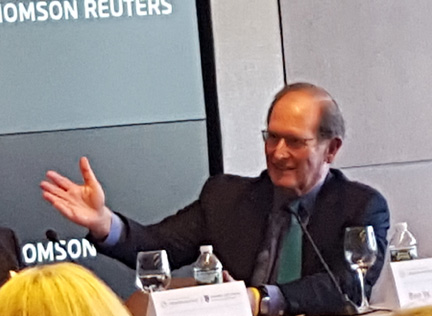NEW YORK — The complex duties of today’s corporate counsel can be such a tightrope act — carefully walking among the board, the CEO and the law — that it’s surprising leotards and long balance poles aren’t given as part of the employment package.
 Ben W. Heineman, Jr., a senior fellow at Harvard Law School’s Center on the Legal Profession and Program on Corporate Governance, spoke yesterday on that delicate balance and how general counsel need to let four main framework ideas lead their overall approach to their role within the company.
Ben W. Heineman, Jr., a senior fellow at Harvard Law School’s Center on the Legal Profession and Program on Corporate Governance, spoke yesterday on that delicate balance and how general counsel need to let four main framework ideas lead their overall approach to their role within the company.
“There has been a revolution of GC’s role within their companies that has transformed both law and business,” said Heineman.
His comments came at an event sponsored by Thomson Reuters and the Harvard Law School, highlighting the public launch of his new book, The Inside Counsel Revolution: Resolving the Partner-Guardian Tension, published by the American Bar Association.
Indeed, the four main framework ideas Heineman described are not some dry, guiding principles; rather, they are the bedrock on which all day-to-day activities and interactions in the corporate legal department should be built. The four framework ideas for GCs include:
1. Fusing together high performance, high integrity, and sound risk management
Heineman said that successfully fusing these elements together at the corporate level not only mitigates risk but also achieves positive benefits within the company, the marketplace, and broader society. Think of it as a “corporation-specific optimization” that creates value for key stakeholders — from shareholders to employees and customers.
2. Becoming the needed lawyer/statesman
Today’s GCs are expected to be outstanding legal experts, wise counselors, and accountable leaders for the company, said Heineman, but that has to be balanced with a strict responsibility to the higher tenants of the law. “The first question should always be, ‘Is it legal?’” he said. “And the last should always be, ‘Is it right?’”
3. Resolving the partner/guardian tension
This is where the tightrope walk gets really tricky. GCs have to balance their duties to the company as an employee and stakeholder with their duty to guard the company from any legal missteps that could damage it. Heineman pointed out that GCs battle a lot of negative perceptions in this area, and attitudes about “company lawyers” as naysayers, being overly cautious, and hurting business are common and must be battled back. “As a GC, you owe it to the board to speak up, even though that may put you cross-ways with your CEO.”
4. Creating and maintaining an ‘integrity culture’
Heineman described this framework idea as one of the most important. The ability to articulate and define shared principles and practices throughout not only the corporate legal department but the company as a whole is vital, he explained, and management walking the walk is key. “It is this culture that will influence how people will feel, think and work,” he explained. “But the leaders have to live it.”
Heineman said instilling these framework ideas within a company have become more important — and more possible — as general counsel have become more “sophisticated, capable, and influential” within a company.
“They are now a core member of top management, participating in discussions beyond risk and the law, to include opportunities and business development,” he said.










